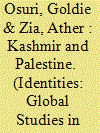|
|
|
Sort Order |
|
|
|
Items / Page
|
|
|
|
|
|
|
| Srl | Item |
| 1 |
ID:
172133


|
|
|
|
|
| Summary/Abstract |
What features of contemporary coloniality emerge if we examine geopolitical alliances across settler and ‘post’ colonial contexts? What forms of solidarity become necessary in the context of these colonialities? Referencing the historical and contemporary features of the occupations of Kashmir & Palestine, the introduction to this special issue makes the case for naming the states of India and Israel as part of a contemporary geocolonial formation. Naming and framing require understanding present forms of coloniality and reflexive solidarity. The essays in this special issue form an archive of coloniality and solidarity through which the authors examine the minutiae of living and of dying, of assembling archives from below, and of building and decolonising solidarities across Kashmir & Palestine.
|
|
|
|
|
|
|
|
|
|
|
|
|
|
|
|
| 2 |
ID:
187446


|
|
|
|
|
| Summary/Abstract |
This article pivots around poetry as a category of analysis; and the figure of a poet as a humanistic optic to look at how forms of resistance are shaped in public and private domains in the Indian occupied Kashmir. The analysis considers poets writing in Kashmiri, other vernacular languages as well as English, and Urdu. In an occupied zone, where a war stands at all corners of the homes and streets, poetry ceases to be mere words. Poetry becomes Ehtijaj (meaning “protest” or “dissent”, both in Urdu and Kashmiri). Poetry as Ehtijaj is a “situated” act, a deeply political gesture; written, embodied, commemorative and sometimes unsaid. It is a form of “placemaking” in the face of erasure and occupation. As a situated act of dissent, of placemaking, poetry emerges also as a “right to a remembered presence” (see Said, E. W. Invention, Memory, and Place. Critical Inquiry, 26 (2), (2000) 175–192). It becomes a way to history, and commemoration, however feeble the effort might seem in face of the hegemony of the occupying power of the Indian nation.
|
|
|
|
|
|
|
|
|
|
|
|
|
|
|
|
| 3 |
ID:
172139


|
|
|
|
|
| Summary/Abstract |
Both Palestine and the Indian held Kashmir have become hallmarks of a postcolonial siege manifest in heavy militarisation, illegal occupation, human rights violations, and an excruciating love born from and for people’s resistance and solidarity. While different, strong overlaps exist between the two conflicts in having been midwifed by the waning British Empire in 1947; subsequent internationalisation and fighting against a type of contemporary international politics that subsumes them under so-called ‘Islamic terrorism.’ Also noticeable is the motif of ‘suffering’ that makes the tragedy of Kashmir resonate with the pathos of Palestine. This paper focuses on the vantage from Kashmir, where people herald the Palestinian struggle as pioneering and a beacon of just struggle. I illustrate how Kashmiris, have come to harbour for the Palestinians an ‘affective solidarity’ which is evident in their modes of resistance to lend support for the liberation of Palestine and credibility to the Kashmir’s own resistance movement.
|
|
|
|
|
|
|
|
|
|
|
|
|
|
|
|
|
|
|
|
|